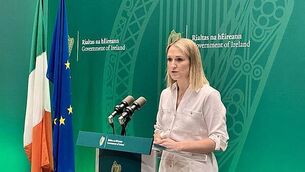Lough Neagh algae blight is significant crisis for all Ireland, Sinn Féin leader says

By Rebecca Black, PA
Lough Neagh is a “very significant crisis” for the whole island of Ireland, Sinn Féin president Mary-Lou McDonald has said.
The lough, which is Ireland and the UK's largest freshwater lake by surface area, was this year blighted by noxious blooms of blue-green algae for the third summer in a row.
It saw the eel-fishing season cut short, as well as advice against bathing at several north coast beaches because of the blue-green algae having been detected moving along the Lower Bann River to the area.
An excess of nutrients has been blamed, which come from a number of sources, including waste water, septic tanks and agriculture, made worse by climate change and an invasive species, zebra mussels.

Northern Ireland's Agriculture, Environment and Rural Affairs Minister Andrew Muir is currently implementing a Lough Neagh Recovery Plan.
Ms McDonald said she led a Sinn Féin delegation in a meeting with Mr Muir at Stormont on Monday.
“We had a lengthy discussion around Lough Neagh and the need for urgent action to address what is a very, very significant crisis not just for the north, but I believe, for the whole island,” she told reporters at Parliament Buildings in Belfast.
“We have agreed that there will need to be a national focus on this, that the Shared Island Unit in Dublin, the Department of An Taoiseach and the wider Dublin government will take an interest in actions to resolve in the short term and the longer term, the issues of the lough as a critical natural resource.”
She added: “I am very conscious of the community, of the stakeholders in and around the lough, the fishermen, the wider community, the fact that it has been very very hard on them, and we have pressed with the minister the need for a financial support package for them, and we are conscious also that ongoing work, and the scaling up of some innovative projects need to be advanced to ensure that the source of 40 per cent of the drinking water is protected in the short and long term.
“It was a very worthwhile meeting, we put a particular emphasis on the need to ensure that there is ongoing, constructive, responsive engagement with all of the stakeholders on this issue.”




